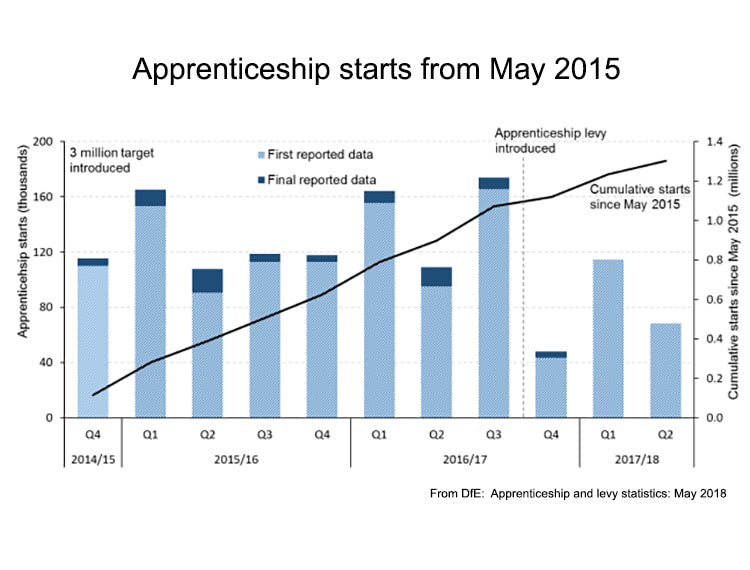Apprenticeship and levy statistics: May 2018 – Sector Response

DfE today (17 May) published their statistics covering latest monthly apprenticeship starts, apprenticeship service registrations and commitments, and apprenticeship levy information.
Between August 2017 and February 2018 there were 232,700 apprenticeship starts (reported to date) compared to 309,000 apprenticeship starts between August 2016 and February 2017 reported at the same point last year.
In February 2018 there were 21,800 apprenticeship starts, compared to 36,400 starts in February 2017 reported at this point last year.
This morning new figures from the Department for Education reveal that the number of apprenticeship starts have fallen significantly, once again, which brings the effectiveness of the new apprenticeship levy into question, highlighting the need for organisations to make the most of their levy funding – or risk losing it!
Sector Response
 Petra Wilton, director of strategy for the Chartered Management Institute, said:
Petra Wilton, director of strategy for the Chartered Management Institute, said:
“Employers are clearly having problems with the bureaucracy of the Apprenticeship Levy but this means it must be reformed, not scrapped. It’s not surprising that the number of apprenticeship starts continues to drop since the success of the programme is pegged to the Levy. We need to make it easier for employers to use the Levy to invest in much-needed skills, like management and leadership. Doing so will be essential for businesses to succeed in a post-Brexit service economy.”
 Apprenticeships and Skills Minister Anne Milton said:
Apprenticeships and Skills Minister Anne Milton said:
“The number of people starting on the old style apprenticeships has fallen, but the number of people starting on our new, higher-quality apprenticeships are increasing well beyond our expectations. We won’t sacrifice that quality to increase quantity.
“More high quality apprenticeships are being developed all the time, including in engineering, aerospace and nuclear, and we will continue working with employers to design apprenticeships which give businesses and apprentices the skills they need to thrive.
“We are unapologetic about our ambition to make sure that everyone, regardless of their background, can access high quality apprenticeship opportunities. That’s what our changes to apprenticeships in this country are all about.”
 Mike Thompson, Head of Apprenticeships at Barclays said:
Mike Thompson, Head of Apprenticeships at Barclays said:
“I continue to believe that the Apprenticeship Levy should be seen as a positive and progressive step for businesses in general and the wider economy as a whole. Not only has the levy offered an excellent opportunity for businesses to invest in their workforce through hiring new staff, developing existing employees and shaping their skills to the requirements of the company, it’s also key in enforcing social mobility and allowing people the chance to enter the workforce who may not have been able to do so otherwise.
“Although the Apprenticeship Levy is not perfect, it is a strong step in the right direction for training a better workforce in this country, so I implore companies and individuals to take this opportunity and use it as best they can.
“The reform is still in it’s infancy, and I firmly believe that it this is only the beginning of great things to come for our country’s workforce.”
 Founder of the Sutton Trust Sir Peter Lampl said:
Founder of the Sutton Trust Sir Peter Lampl said:
“High quality apprenticeships offer genuine alternatives to A-levels and degrees so it is good to see progress on the number of starts at higher levels. The Government is right to focus on creating more high-quality routes and it is vital that young people from low and moderate income backgrounds access them. Our polling shows that there is an ingrained negative attitude to apprenticeships amongst teachers, parents and young people which must be urgently addressed.”
 Stephen Evans, Chief Executive, Learning and Work Institute said:
Stephen Evans, Chief Executive, Learning and Work Institute said:
“Alarm bells will surely be ringing in government, whatever their outward confidence, as apprenticeship starts remain well down on last year. Are employers taking their time to adapt to the new system, or has quality increased as the government now argues, or is there a fundamental flaw? In truth, it’s likely a mix of all three. The Levy is an important and welcome change, but quality and access will be the ultimate measures of success, not starts.”
 Association of Employment and Learning Providers CEO Mark Dawe said:
Association of Employment and Learning Providers CEO Mark Dawe said:
“The levy itself isn’t the problem but as MPs on the select committee made clear to the minister on Tuesday, the manner of its implementation is letting down thousands of SMEs and young people across the country.
“Our simple solution has been sitting on the minister’s desk for months, namely that for the time being the government should stop charging small employers for taking on young apprentices at levels 2 and 3. Action must be taken now if the government wants to achieve its manifesto target.”
 Teresa Frith, Senior Policy Manager at the Association of Colleges, said:
Teresa Frith, Senior Policy Manager at the Association of Colleges, said:
“In the short term, the introduction of the levy has resulted in a drastic reduction in new starts. Although the levy has generated new interest in apprenticeships, many employers appear to be waiting until they are confident that the new standards work and that they can afford to meet the new requirements for apprenticeships. There should be a review of the rules that grant levy paying employers control of 110% of their funds. This gives larger employers the first call on training funds and squeezes smaller employers into second place. The policy also needs to mature and recognise the needs of individuals looking to undertake an apprenticeship, particularly those from socially disadvantaged backgrounds.”
 David Willett, Corporate Director at The Open University, comments on the most recent DfE Apprenticeship and Levy statistics:
David Willett, Corporate Director at The Open University, comments on the most recent DfE Apprenticeship and Levy statistics:
“The Apprenticeship Levy has had its teething problems, which have made it difficult for employers to get on board with the initiative; we recently found that only 8 per cent of levy funds have been withdrawn so far by employers to fund training, with £1.28 billion sitting unused in levy accounts.
“We’re now into the second year of the levy and time will soon run out for employers who are wanting to invest in their workforce through their levy funding, as funds will begin to be absorbed by the government from April 2019. Employers should make the most of their levy funding, and with the fourth industrial revolution picking up pace and Brexit on the horizon investing in the skills and agility of employees is more important than ever for organisations. Those that embrace work-based learning will survive and thrive in this challenging time.”
Statistics from The Open University’s report – The Apprenticeship Levy: One Year On
- A year on from the introduction of the Apprenticeship Levy organisations had withdrawn just £108 million of the £1.39 billion they’d paid in
- From April 2019, employers could start losing as much as £139 million a month that could be used to build up skills
- It can take up to nine months to get an apprenticeship programme up and running – and 30% of the organisations who have accessed the funding said the process took longer than expected
- 92% of levy paying organisations agree with the apprenticeship levy in principle, but two in five (43%) would like to see some changes
- Time is a significant barrier:
- 15% are concerned about the resource required to develop a strategy
- 16% say the time it takes to research providers and courses is too much
- Flexibility is another factor affecting uptake – 24% of business leaders agree that apprenticeship standards need to be approved more quickly as the current delays limit the training options available to them
This publication provides headline official statistics on the use of the apprenticeship service. These include apprenticeship service account registrations (ASAs) and numbers of commitments (reported to March 2018), where an apprentice who is expected to go on to start has been recorded in the system.
Additionally, monthly apprenticeship starts information for the first 7 months of the 2017 to 2018 academic year are also presented (reported to February 2018).
For more further education (FE) statistics, please refer to the FE and skills statistics publication, and the FE data library.
DfE may adjust the content and timing of these statistics, depending on user feedback and data reporting.
Further education statistical dissemination team
Emma Walker
Department for Education
Sanctuary Buildings
Great Smith St
London
SW1P 3BT
Apprenticeship and levy statistics: April 2018
On the back of the government releasing annual data (19 Apr) showing a drop in apprenticeship starts,
Petra Wilton, director of strategy for the Chartered Management Institute, said:
“Today’s apprenticeship figures show the government has got a lot of work to do to get employers on-board with the apprenticeship programme. According to CMI research, nearly half of managers have doubts about the government hitting its target of 3m apprentices by 2020 – but are still overwhelmingly in support of apprenticeships for all ages. They also back the Apprenticeship Levy to transform how employers invest in skills.
“While the number of apprenticeship enrolments have predictably dropped as employers get to grips with changes to the system, CMI research shows that, nationally speaking, nearly half of all managers expect to see a rise in new starts over the next 12 months. One in three managers expect to have more people starting apprenticeship programmes over the coming year, compared to the period since April 2017.
“Clarity will be essential as the government continues to work with employers, particularly SMEs, to dial-up the apprenticeship programme. We welcomed the Chancellor’s recently announced £80m fund to help small businesses access the Apprenticeship Levy, and look forward to seeing details on how this will work in practice. We also want access to the digital apprenticeships service to be extended to small businesses to drive up apprenticeship numbers.
“Managers and employers need certainty to aid the planning of their apprenticeship programmes. We urge the government to remain firm in its commitment to the Levy in its current format and existing funding bands. If the government is to remain in track to reach its target of 3m apprentices by 2020, it must help employers adjust to the new system without any further disruptions.”
CMI research found that 65% of employers say graduates lack the interpersonal skills necessary to manage people. The leadership skills gap means that more than 2 million more managers are needed by 2024.
A report from Universities UK earlier this year found that Management Degree Apprenticeships were the fastest growing degree level apprenticeships, alongside digital and engineering.
New Chartered Management Degree Apprenticeships were introduced in November 2015, the Chartered Management Institute led a group of 40 employers to create management apprenticeships, including the flagship Chartered Manager Degree Apprenticeship, and the Senior Leader Master’s Degree Apprenticeship for senior managers and executives.
February 2018 – survey of 1,640 managers
- Nearly half of managers doubt the government will hit its target of 3m apprentices by 2020.
- Number of apprenticeship starts may have dropped but there is clear need and support for the Apprenticeship Levy among managers:
- Nearly two thirds of employers (63%) agree that the Apprenticeship Levy is needed to increase employer investment skills
- 31% expect to have more people starting new apprenticeship programmes over the coming year, compared to the period since April 2017
- Nearly half (48%) of managers across the country expect to see a rise in the number of new starts in the next 12 months
- One in four organisations have put employees on to management and leadership apprenticeships since the Levy came into effect in April 2017
- 22% say there will be more new management and leadership apprentices











Responses